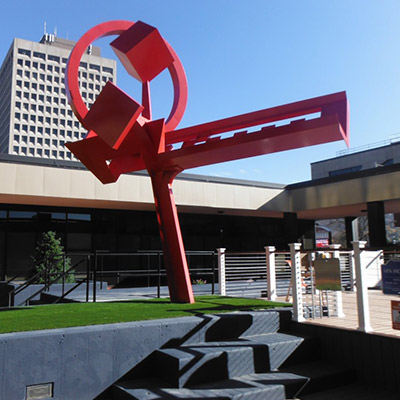Reviewed by Dave Schriber
“BBC Murders” is a collection of four Agatha Christie murder mysteries, each of which was broadcast as a radio play by the BBC between 1937 and 1954. The Cider Mill Playhouse production set the dramas in the context of a radio broadcast, actors lined up in front of vintage microphones with a sound effects bay behind. There was no scenery, no period costume, and, most disappointing, limited acting. It was more of a dramatic reading, with scripts in hand as would have been done in the original radio broadcast, than it was theater. The sound effects were neither visually interesting nor effective. The same heavy clomping of shoes accompanied both a small woman and a large man walking. I tried closing my eyes but still the sound effects didn’t blend well with the spoken word.
The actors began to play off one another in the second segment. By the second half of the show they were acting more than reading, with the result that the actors were often off microphone, which would have been a problem for actual radio broadcasting.
Carol Hanscom and Tom Kremer, both BU theater professors and directors of this production, gave strong performances. Bobby Daglio played a lugubrious butler with comedic melancholy. Chelsea Pace, perched seductively atop the piano, sang with charm as an Argentinian cabaret chanteuse. Richard Mancuso as Belgian detective Hercule Poirot began “Yellow Iris” with an excellent French accent and much expression, but ended the segment reading the script rather mechanically.
H. Marshall McLuhan, the communications guru of the 1960s, distinguished “hot” from “cool” media. “Hot” media (such as TV and theater) bombard multiple senses while “cool” media (such as radio and books) leave much to the imagination. Today’s media tend to be “hot”-dominant — think Imax theaters with huge screens and deafening sound. Compared with movies and TV, radio is a “cool” medium, inviting listeners to participate by painting their own mental scenery.
The concept of the radio play itself works because it actively involves the listener. The concept of a radio play presented just as a radio play on stage just doesn’t seem to work. It would have been much more effective to present this production as a radio play being broadcast from a night club or a theater, where scenery, acting and memorized lines would have successfully converted the medium from “cool” to “hot.”
For lovers of Agatha Christie murder mysteries, it was fun just to hear these more obscure short stories read, but if it was stage theater you were expecting, “BBC Murders” was a disappointment.




































